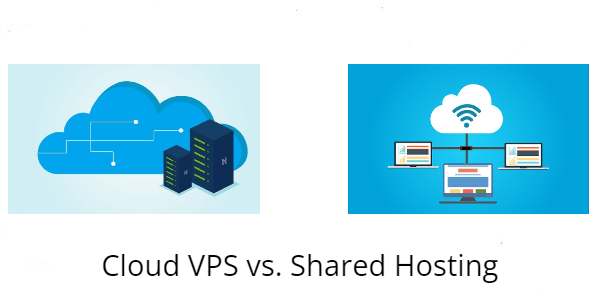Cloud VPS and shared hosting are two different types of hosting. Each with its advantages and disadvantages. As a business owner, you need to understand the differences between Cloud VPS vs Shared Hosting. So that you can choose the right type of web hosting for your website.

Table of contents
What is Cloud VPS?
Cloud VPS are virtual servers hosted on cloud computing platforms. Like physical hosting, it runs on top of your regular server. Including eCommerce stores and managed WordPress hosting to start blogging on WordPress. You can use it for any application or website.
There are several advantages to dedicated hosting over shared hosting:
- Hardware resources are under your control. So you don’t have to worry about how much RAM or hard drive space you’re using. If one component fails or crashes. You won’t lose data because someone else didn’t patch their servers before they crashed.
- Whenever something goes wrong with the servers running on top of them (like an infrastructure provider). They’ll fix it while keeping everything up so that users do not experience any downtime at all. Even during maintenance periods, which otherwise would cause problems for everyone!
Advantages of Cloud VPS
- More control over your server
- Better security
- More features
- Better performance and scalability (the ability to scale up or down as needed)
- Reliability, which means that servers are less likely to crash. Or be offline than on shared hosting accounts.
Disadvantages of Cloud VPS
There are a few disadvantages of cloud VPS and shared hosting. First, you have to manage it yourself. If your skills aren’t up to snuff yet, this can be a problem.
Second, if you don’t know how to use the command line, the control panel, or the terminal (or even better, all three). Then, getting started with cloud VPS is going to be difficult for you. And most likely impossible at first!
What is Shared hosting?
Shared hosting is a web hosting service that allows many domain names to live on a single web server. This means that you have access to more space and bandwidth with cloud servers or dedicated servers. But there are some limitations.
Shared Hosting is great for small businesses to make a good website. This is a cheap web hosting and easy to set up and maintain. And allows you to focus on your business rather than worrying about technical issues like security threats or backups. Yet, if you’re starting as an entrepreneur. Or looking for something faster than shared hosting. And that will take care of most of your needs but not everything!
Advantages of Shared Hosting
- Shared hosting is cost-effective.
- Shared hosting is easy to set up and maintain.
- Shared hosting scales easily as your website grows with no need for extra hardware or software.
- You can migrate your website and blog to another server with minimal effort if necessary. (if you want more power or faster speeds).
Disadvantages of Shared Hosting
- Shared hosting is cheaper than cloud VPS.
- Shared hosting is easier to set up than cloud VPS.
- This is more secure than cloud VPS.
- Shared hosting has more features than cloud VPS.
Difference between Cloud VPS and Shared Hosting
When it comes to Cloud VPS vs Shared Hosting most people, Cloud VPS is the best option. It’s more expensive than Shared Hosting. But it provides better security, reliability, and flexibility. You can also choose from a variety of different providers to find one that suits your needs.
Shared hosting is cheaper than cloud hosting, but it’s easier for beginners. Who doesn’t know what they’re doing or doesn’t want to think about their website managing tasks? Because this type of service isn’t as secure or reliable. As the other two types listed above (although some providers do offer both).
Understanding the differences between shared hosting. And a Cloud VPS is important to make the right choice for your business.
Shared hosting is a type of hosting where many users share resources. And that resources are shared across many servers. Cloud VPS refers to virtual private servers. That run on top of a cloud service provider’s infrastructure.
How Cloud VPS is different from Shared Hosting.
- The amount of storage space offered by a cloud provider varies greatly depending on what plan you choose. This means that if your site gets too large for your current plan (or vice versa).
- It will be difficult to upgrade or downgrade without paying extra fees. Shared hosts usually do not offer extra storage space as part of their plans.
- So, if you need more storage for data growth. Or want better performance than what’s available through your existing plan. Before switching over to another provider. Then, it may be worth looking into purchasing extra disk space instead!
Conclusion
Comparing Cloud VPS vs Shared Hosting is a great option for small businesses. And looking to scale up their operations without paying the high prices of dedicated servers. With these services, you can run your server and access powerful features. Like backups, security updates, and more. So shared hosting will work for many businesses. And that doesn’t need all those extra bells and whistles. It’s also cheaper than using dedicated resources for just one site or app!
thanks for sharing Difference between Cloud VPS and Shared Hosting. This blog will be useful for content writer ,Keep it up :